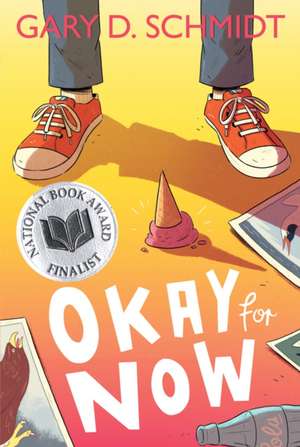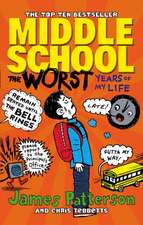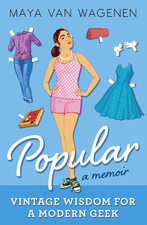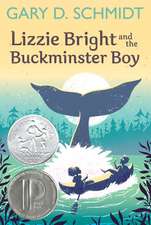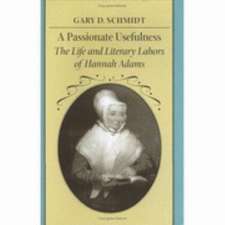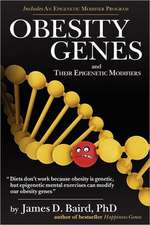Okay for Now: A National Book Award Winner
Autor Gary D. Schmidten Limba Engleză Paperback – 4 feb 2013 – vârsta până la 12 ani
National Book Award Finalist "[A] stealthily powerful, unexpectedly affirming story of discovering and rescuing one’s best self."—Booklist, starred reviewIn this companion novel to The Wednesday Wars, Doug struggles to be more than the "skinny thug" that some people think him to be. He finds an unlikely ally in Lil Spicer, who gives him the strength to endure an abusive father, the suspicions of a town, and the return of his oldest brother, forever scarred, from Vietnam. Schmidt expertly weaves multiple themes of loss and recovery in a story teeming with distinctive, unusual characters and invaluable lessons about love, creativity, and survival.
| Toate formatele și edițiile | Preț | Express |
|---|---|---|
| Paperback (2) | 60.80 lei 3-5 săpt. | +20.23 lei 7-13 zile |
| HarperCollins Publishers – 4 feb 2013 | 60.80 lei 3-5 săpt. | +20.23 lei 7-13 zile |
| Gale, a Cengage Company – 28 ian 2020 | 82.25 lei 3-5 săpt. |
Preț: 60.80 lei
Nou
Puncte Express: 91
Preț estimativ în valută:
11.64€ • 12.10$ • 9.74£
11.64€ • 12.10$ • 9.74£
Carte disponibilă
Livrare economică 22 februarie-08 martie
Livrare express 08-14 februarie pentru 30.22 lei
Preluare comenzi: 021 569.72.76
Specificații
ISBN-13: 9780544022805
ISBN-10: 0544022807
Pagini: 384
Dimensiuni: 130 x 194 x 24 mm
Greutate: 0.3 kg
Editura: HarperCollins Publishers
Colecția Clarion Books
Locul publicării:United States
ISBN-10: 0544022807
Pagini: 384
Dimensiuni: 130 x 194 x 24 mm
Greutate: 0.3 kg
Editura: HarperCollins Publishers
Colecția Clarion Books
Locul publicării:United States
Recenzii
"This is Schmidt's best novel yet—darker than The Wednesday Wars and written with more restraint, but with the same expert attention to voice, character and big ideas."—Kirkus Reviews, starred review
"Reproductions of Audubon plates introduce each chapter in this stealthily powerful, unexpectedly affirming story of discovering and rescuing one’s best self, despite family pressure to do otherwise."—Booklist, starred review"Readers will miss Doug and his world when they’re done, and will feel richer for having experienced his engaging, tough, and endearing story."—School Library Journal, starred review
"The book is exceptionally well written. Schmidt creates characters that will remain with the reader long after the book is done. Doug’s voice is unforgettable as he tries to help and protect his mom. . . .While there is much stacked against him, he is a character filled with hope that the reader cannot help but root for. Push this one on readers; they will not be sorry. . . .Schmidt writes a journal-type story with a sharp attention to detail, patterns in the story line, and an unexpected twist at the end."–VOYA
Notă biografică
Gary D. Schmidt is the author of the Newbery Honor and Printz Honor book Lizzie Bright and the Buckminster Boy. His most recent novel is The Wednesday Wars. He is a professor of English at Calvin College in Grand Rapids, Michigan.
Extras
Chapter One: The Arctic Tern Plate CCL
Joe Pepitone once gave me his New York Yankees baseball cap. I’m not lying. He gave it to me. To me, Doug Swieteck. To me. Joe Pepitone and Horace Clarke came all the way out on the Island to Camillo Junior High and I threw with them. Me and Danny Hupfer and Holling Hoodhood, who were good guys. We all threw with Joe Pepitone and Horace Clarke, and we batted too. They sang to us while we swung away: "He’s a batta, he’s a battabatta- batta, he’s a batta . . ." That was their song. And afterward, Horace Clarke gave Danny his cap, and Joe Pepitone gave Holling his jacket (probably because he felt sorry for him on account of his dumb name), and then Joe Pepitone handed me his cap. He reached out and took it off his head and handed it to me. Just like that. It was signed on the inside, so anyone could tell that it was really his. Joe Pepitone’s. It was the only thing I ever owned that hadn’t belonged to some other Swieteck before me. I hid it for four and a half months. Then my stupid brother found out about it. He came in at night when I was asleep and whipped my arm up behind my back so high I couldn’t even scream it hurt so bad and he told me to decide if I wanted a broken arm or if I wanted to give him Joe Pepitone’s baseball cap. I decided on the broken arm. Then he stuck his knee in the center of my spine and asked if I wanted a broken back along with the broken arm, and so I told him Joe Pepitone’s cap was in the basement behind the oil furnace. It wasn’t, but he went downstairs anyway. That’s what a chump he is. So I threw on a T-shirt and shorts and Joe Pepitone’s cap—which was under my pillow the whole time, the jerk—and got outside. Except he caught me. Dragged me behind the garage. Took Joe Pepitone’s baseball cap. Pummeled me in places where the bruises wouldn’t show. A strategy that my . . . is none of your business. I think he kept the cap for ten hours—just long enough for me to see him with it at school. Then he traded it to Link Vitelli for cigarettes, and Link Vitelli kept it for a day—just long enough for me to see him with it at school. Then Link traded it to Glenn Dillard for a comb. A comb! And Glenn Dillard kept it for a day—just long enough for me to see him with it at school. Then Glenn lost it while driving his brother’s Mustang without a license and with the top down, the jerk. It blew off somewhere on Jerusalem Avenue. I looked for it for a week. I guess now it’s in a gutter, getting rained on or something. Probably anyone who walks by looks down and thinks it’s a piece of junk. They’re right. That’s all it is. Now. But once, it was the only thing I ever owned that hadn’t belonged to some other Swieteck before me. I know. That means a big fat zero to anyone else. I tried to talk to my father about it. But it was a wrong day. Most days are wrong days. Most days he comes home red-faced with his eyes half closed and with that deadly silence that lets you know he’d have a whole lot to say if he ever let himself get started and no one better get him started because there’s no telling when he’ll stop and if he ever did get started then pretty Mr. Culross at freaking Culross Lumber better not be the one to get him started because he’d punch pretty Mr. Culross’s freaking lights out and he didn’t care if he did lose his job over it because it’s a lousy job anyway. That was my father not letting himself get started. But I had a plan. All I had to do was get my father to take me to Yankee Stadium. That’s all. If I could just see Joe Pepitone one more time. If I could just tell him what happened to my baseball cap. He’d look at me, and he’d laugh and rough up my hair, and then he’d take off his cap and he’d put it on my head. "Here, Doug," Joe Pepitone would say. Like that. "Here, Doug. You look a whole lot better in it than I do." That’s what Joe Pepitone would say. Because that’s the kind of guy he is. That was the plan. And all I had to do was get my father to listen. But I picked a wrong day. Because there aren’t any right days. And my father said, "Are you crazy? Are you freaking crazy? I work forty-five hours a week to put food on the table for you, and you want me to take you to Yankee Stadium because you lost some lousy baseball cap?" "It’s not just some lousy—" That’s all I got out. My father’s hands are quick. That’s the kind of guy he is. Who knows how much my father got out the day he finally let himself get started saying what he wanted to say to pretty Mr. Culross and didn’t even try to stop himself from saying it. But whatever he said, he came home with a pretty good shiner, because pretty Mr. Culross turned out to have hands even quicker than my father’s. And pretty Mr. Culross had one other advantage: he could fire my father if he wanted to. So my father came home with his lunch pail in his hand and a bandage on his face and the last check he would ever see from Culross Lumber, Inc., and he looked at my mother and said, "Don’t you say a thing," and he looked at me and said, "Still worried about a lousy baseball cap?" and he went upstairs and started making phone calls. Mom kept us in the kitchen. He came down when we were finishing supper, and Mom jumped up from the table and brought over the plate she’d been keeping warm in the oven. She set it down in front of him. "It’s not all dried out, is it?" he said. "I don’t think so," Mom said. "You don’t think so," he said, then took off the aluminum foil, sighed, and reached for the ketchup. He smeared it all over his meat loaf. Thick. Took a red bite. "We’re moving," he said. Chewed. "Moving?" said my mother. "To Marysville. Upstate." Another red bite. Chewing. "Ballard Paper Mill has a job, and Ernie Eco says he can get me in." "Ernie Eco," said my mother quietly. "Don’t you start about him," said my father. "So it will begin all over again." "I said—" "The bars, being gone all night, coming back home when you’re—" My father stood up. "Which of your sons will it be this time?" my mother said. My father looked at me. I put my eyes down and worked at what was left of my meat loaf. ***It took us three days to pack. My mother didn’t talk much the whole time. The first morning, she asked only two questions. "How are we going to let Lucas know where we’ve gone?" Lucas is my oldest brother who stopped beating me up a year and a half ago when the United States Army drafted him to beat up Vietcong instead. He’s in a delta somewhere but we don’t know any more than that because he isn’t allowed to tell us and he doesn’t write home much anyway. Fine by me. My father looked up from his two fried eggs. "How are we going to let Lucas know where we’ve gone? The U.S. Postal Service," he said in that kind of voice that makes you feel like you are the dope of the world. "And didn’t I tell you over easy?" He pushed the plate of eggs away, picked up his mug of coffee, and looked out the window. "I’m not going to miss this freaking place," he said. Then, "Are you going to rent a truck?" my mother asked, real quiet. My father sipped his coffee. Sipped again. "Ernie Eco will be down with a truck from the mill," he said. My mother didn’t ask anything else. My father brought home boxes from the A&P on one of those summer days when the sky is too hot to be blue and all it can work up is a hazy white. Everything is sweating, and you’re thinking that if you were up in the top—I mean, the really top—stands in Yankee Stadium, there might be a breeze, but probably there isn’t one anywhere else. My father gave me a box that still smelled like the bananas it brought up from somewhere that speaks Spanish and told me to put in whatever I had and I should throw out anything I couldn’t get in it. I did—except for Joe Pepitone’s cap because it’s lying in a gutter getting rained on, which you might remember if you cared. So what? So what? I’m glad we’re going. After the first day of packing, the house was a wreck. Open boxes everywhere, with all sorts of stuff thrown in. My mother tried to stick on labels and keep everything organized—like all the kitchen stuff in the boxes in the kitchen, and all the sheets and pillowcases and towels in the boxes by the linen closet upstairs, and all the sturdiest boxes by the downstairs door for my father’s tools and junk. But after he filled the boxes by the downstairs door, he started to load stuff in with the dishes, stuff like screwdrivers and wrenches and a vise that he dropped on a stack of plates, and he didn’t even turn around to look when he heard them shatter. But my mother did. She lifted out the pieces she had wrapped in newspaper, and for a moment she held them close to her. Then she dropped them back in the box like they were garbage, because that’s all they were now. Garbage. Like Joe Pepitone’s cap. On the third day, Ernie Eco came down with the truck, and me and my brother and Ernie Eco and my father loaded the beds and the couch and the table and chairs—the stove and the refrigerator belonged to the guy we rented the house from. After that we loaded all the boxes. My mother had dug up the garden she’d worked on and put the plants into pots and watered them for the trip, but Ernie Eco said there wasn’t any room for them and even if there were he might have to make a quick turn and they’d flip over and get the truck all dirty and so my father said to leave them and we should all get in the car since we were ready to go. "Not yet," my mother said. We all looked at her, kind of startled. She went back to the pots, all lined up on the front porch, and she took three in her arms and carried them to the McCall house next door. Then she came back, took up another three, and carried them across the street to the Petronis. When she came back again, I started up to the porch to help but my father smacked me on the shoulder. "If she wants to do it, let her do it herself," he said. Ernie Eco laughed, the jerk. So my mother carried all the pots, three by three, and put them by houses up and down the street. People started coming out on their stoops and they’d take the pots from her and put them down and they’d hug my mother and then she’d turn away. So that’s what I was doing—watching my mother give away her plants—when Holling Hoodhood came up the street carrying a brown paper bag. I’d never seen him on this side of town before. He waved. "Hey, Doug," he said. "Hey," I said. "Mr. Swieteck." My father nodded. He watched my mother. He wanted to get going. A minute passed. My mother was back up on the porch, gathering another armload. "I heard you were moving," said Holling. "You heard right," I said. He nodded. "No eighth grade at Camillo Junior High." "I guess not." He nodded again. Another minute passing. "So," he said, "I brought you something to remember us by." He held up the bag and I took it. It wasn’t heavy. "Thanks," I said. Another minute. "Where are you moving?" "Marysville." "Oh," said Holling. He nodded like he’d heard of it, which he hadn’t since no one has ever heard of it unless he lives there, which hardly anyone does. "Marysville." "In the Catskills," I said. He nodded. "It’ll be cooler up in the mountains." I nodded. "Maybe." He rubbed his hands together. "You take care of yourself, Doug," he said. "Say hi to everyone for me," I said. "I will." He held out his hand. I took it. We shook. "So long, Doug." "So long." And he turned, walked across the street, said hi to my mother. She handed him one of her plants. He took it, and then he was gone. Like that. "Go get in the car," said my father. I went over to the car, but before I got in, I opened up Holling’s brown paper bag and took out what was inside. A jacket. A New York Yankees jacket. I looked at the signature on the inside of the collar. You know whose jacket this was, right? I put it on. I didn’t care how white the sky was, or how much the whole world was sweating. It felt like the breezes on the top stands of Yankee Stadium. "What a stupid thing to give you in the summer," said my father. I zipped up the jacket. "Get in the freaking car!" Didn’t I tell you that Holling Hoodhood is a good guy?
***
When we got to Marysville, around noon, we found the house that Ernie Eco had set up for us past the Ballard Paper Mill, past the railroad yard, and past the back of a bunch of stores and an old bar that looked like no one who went in there went in happy. The house was smaller than the one we’d had, so I had to room with my brother still—and there wasn’t a bedroom for Lucas if he came home. My brother said he’d sleep on a couch in the living room at night so he didn’t have to room with a puke, but my father said he didn’t want him hanging around like he owned the place or something. So he moved his stuff up with me. Terrific. The first thing I had to do was find a place to hide the jacket, which my brother didn’t know was Joe Pepitone’s. If he had known, he’d have ripped it off me before we’d crossed the Throgs Neck Bridge. But he would find out. He always found out. So I kept it on, even though Holling Hoodhood was wrong and it was just as hot in Marysville as on Long Island and I was melting inside so bad that I was afraid I’d sweat Joe Pepitone’s signature off. My father said he was going with Ernie Eco to the Ballard Paper Mill to sign some forms so he could begin work on Monday, and my mother said she didn’t think the Ballard Paper Mill would be open today, on a Saturday, and my father said what did she know about anything and left with Ernie Eco. So my brother and I carried all the furniture in, and I carried all the boxes in, except my mother told me to leave the kitchen boxes on the truck until she got the kitchen clean enough so a human being could eat in there without getting sick—which she hadn’t finished doing by the time my father got home. It turned out to be one of the wrong days. Again. Of course. My father couldn’t figure out why my mother hadn’t gotten the kitchen ready. He couldn’t figure out why we hadn’t gotten the kitchen boxes off the truck. He couldn’t figure out why my mother hadn’t gotten groceries yet. All she had to do was walk over to Spicer’s Deli! He couldn’t figure out why there wasn’t food on the table for lunch. She had time enough to get the crucifix up in the hall, but she didn’t have time enough to make a couple of sandwiches? It was already two o’clock! And he really couldn’t figure out why Mr. Big Bucks Ballard was only going to give him a salary that was barely half of what Ernie Eco had promised. I told him we didn’t have lunch yet because how were we supposed to know where Spicer’s Deli was and he had taken the car anyway and Mom had to clean up the kitchen because he sure wouldn’t have wanted to eat in this dump before she did that. My father turned to look at me, and then his hand flashed out. He has quick hands, like I told you. "Why don’t you just stay here in your new jacket and get those boxes off the truck and into the nice, clean kitchen while we go out to find a diner?" he said. He told my mother to go get in the car, and my brother too—who smirked and swung like he was going to hit my other eye—and then they were gone, and I was left alone in The Dump. I went down to the basement and looked around. There was only a single light bulb hanging, and it shone maybe fifteen watts. Maybe ten. A huge octopus of a furnace reached across most of the ceiling, and cobwebs hung on its tentacles, drifting up when I walked beneath them. Under the stairs it was open and dry and dark—a few old paint cans piled on top of each other, a couple of broken window frames, something dead that once had fur. I looked around and found a nail—you can always find a nail in an old basement—and hammered it in behind one of the stairs. That’s where I hung Joe Pepitone’s jacket. Then I got those boxes off the truck. And after that, I went out to explore the great metropolis of Marysville, New York. Terrific.
Joe Pepitone once gave me his New York Yankees baseball cap. I’m not lying. He gave it to me. To me, Doug Swieteck. To me. Joe Pepitone and Horace Clarke came all the way out on the Island to Camillo Junior High and I threw with them. Me and Danny Hupfer and Holling Hoodhood, who were good guys. We all threw with Joe Pepitone and Horace Clarke, and we batted too. They sang to us while we swung away: "He’s a batta, he’s a battabatta- batta, he’s a batta . . ." That was their song. And afterward, Horace Clarke gave Danny his cap, and Joe Pepitone gave Holling his jacket (probably because he felt sorry for him on account of his dumb name), and then Joe Pepitone handed me his cap. He reached out and took it off his head and handed it to me. Just like that. It was signed on the inside, so anyone could tell that it was really his. Joe Pepitone’s. It was the only thing I ever owned that hadn’t belonged to some other Swieteck before me. I hid it for four and a half months. Then my stupid brother found out about it. He came in at night when I was asleep and whipped my arm up behind my back so high I couldn’t even scream it hurt so bad and he told me to decide if I wanted a broken arm or if I wanted to give him Joe Pepitone’s baseball cap. I decided on the broken arm. Then he stuck his knee in the center of my spine and asked if I wanted a broken back along with the broken arm, and so I told him Joe Pepitone’s cap was in the basement behind the oil furnace. It wasn’t, but he went downstairs anyway. That’s what a chump he is. So I threw on a T-shirt and shorts and Joe Pepitone’s cap—which was under my pillow the whole time, the jerk—and got outside. Except he caught me. Dragged me behind the garage. Took Joe Pepitone’s baseball cap. Pummeled me in places where the bruises wouldn’t show. A strategy that my . . . is none of your business. I think he kept the cap for ten hours—just long enough for me to see him with it at school. Then he traded it to Link Vitelli for cigarettes, and Link Vitelli kept it for a day—just long enough for me to see him with it at school. Then Link traded it to Glenn Dillard for a comb. A comb! And Glenn Dillard kept it for a day—just long enough for me to see him with it at school. Then Glenn lost it while driving his brother’s Mustang without a license and with the top down, the jerk. It blew off somewhere on Jerusalem Avenue. I looked for it for a week. I guess now it’s in a gutter, getting rained on or something. Probably anyone who walks by looks down and thinks it’s a piece of junk. They’re right. That’s all it is. Now. But once, it was the only thing I ever owned that hadn’t belonged to some other Swieteck before me. I know. That means a big fat zero to anyone else. I tried to talk to my father about it. But it was a wrong day. Most days are wrong days. Most days he comes home red-faced with his eyes half closed and with that deadly silence that lets you know he’d have a whole lot to say if he ever let himself get started and no one better get him started because there’s no telling when he’ll stop and if he ever did get started then pretty Mr. Culross at freaking Culross Lumber better not be the one to get him started because he’d punch pretty Mr. Culross’s freaking lights out and he didn’t care if he did lose his job over it because it’s a lousy job anyway. That was my father not letting himself get started. But I had a plan. All I had to do was get my father to take me to Yankee Stadium. That’s all. If I could just see Joe Pepitone one more time. If I could just tell him what happened to my baseball cap. He’d look at me, and he’d laugh and rough up my hair, and then he’d take off his cap and he’d put it on my head. "Here, Doug," Joe Pepitone would say. Like that. "Here, Doug. You look a whole lot better in it than I do." That’s what Joe Pepitone would say. Because that’s the kind of guy he is. That was the plan. And all I had to do was get my father to listen. But I picked a wrong day. Because there aren’t any right days. And my father said, "Are you crazy? Are you freaking crazy? I work forty-five hours a week to put food on the table for you, and you want me to take you to Yankee Stadium because you lost some lousy baseball cap?" "It’s not just some lousy—" That’s all I got out. My father’s hands are quick. That’s the kind of guy he is. Who knows how much my father got out the day he finally let himself get started saying what he wanted to say to pretty Mr. Culross and didn’t even try to stop himself from saying it. But whatever he said, he came home with a pretty good shiner, because pretty Mr. Culross turned out to have hands even quicker than my father’s. And pretty Mr. Culross had one other advantage: he could fire my father if he wanted to. So my father came home with his lunch pail in his hand and a bandage on his face and the last check he would ever see from Culross Lumber, Inc., and he looked at my mother and said, "Don’t you say a thing," and he looked at me and said, "Still worried about a lousy baseball cap?" and he went upstairs and started making phone calls. Mom kept us in the kitchen. He came down when we were finishing supper, and Mom jumped up from the table and brought over the plate she’d been keeping warm in the oven. She set it down in front of him. "It’s not all dried out, is it?" he said. "I don’t think so," Mom said. "You don’t think so," he said, then took off the aluminum foil, sighed, and reached for the ketchup. He smeared it all over his meat loaf. Thick. Took a red bite. "We’re moving," he said. Chewed. "Moving?" said my mother. "To Marysville. Upstate." Another red bite. Chewing. "Ballard Paper Mill has a job, and Ernie Eco says he can get me in." "Ernie Eco," said my mother quietly. "Don’t you start about him," said my father. "So it will begin all over again." "I said—" "The bars, being gone all night, coming back home when you’re—" My father stood up. "Which of your sons will it be this time?" my mother said. My father looked at me. I put my eyes down and worked at what was left of my meat loaf. ***It took us three days to pack. My mother didn’t talk much the whole time. The first morning, she asked only two questions. "How are we going to let Lucas know where we’ve gone?" Lucas is my oldest brother who stopped beating me up a year and a half ago when the United States Army drafted him to beat up Vietcong instead. He’s in a delta somewhere but we don’t know any more than that because he isn’t allowed to tell us and he doesn’t write home much anyway. Fine by me. My father looked up from his two fried eggs. "How are we going to let Lucas know where we’ve gone? The U.S. Postal Service," he said in that kind of voice that makes you feel like you are the dope of the world. "And didn’t I tell you over easy?" He pushed the plate of eggs away, picked up his mug of coffee, and looked out the window. "I’m not going to miss this freaking place," he said. Then, "Are you going to rent a truck?" my mother asked, real quiet. My father sipped his coffee. Sipped again. "Ernie Eco will be down with a truck from the mill," he said. My mother didn’t ask anything else. My father brought home boxes from the A&P on one of those summer days when the sky is too hot to be blue and all it can work up is a hazy white. Everything is sweating, and you’re thinking that if you were up in the top—I mean, the really top—stands in Yankee Stadium, there might be a breeze, but probably there isn’t one anywhere else. My father gave me a box that still smelled like the bananas it brought up from somewhere that speaks Spanish and told me to put in whatever I had and I should throw out anything I couldn’t get in it. I did—except for Joe Pepitone’s cap because it’s lying in a gutter getting rained on, which you might remember if you cared. So what? So what? I’m glad we’re going. After the first day of packing, the house was a wreck. Open boxes everywhere, with all sorts of stuff thrown in. My mother tried to stick on labels and keep everything organized—like all the kitchen stuff in the boxes in the kitchen, and all the sheets and pillowcases and towels in the boxes by the linen closet upstairs, and all the sturdiest boxes by the downstairs door for my father’s tools and junk. But after he filled the boxes by the downstairs door, he started to load stuff in with the dishes, stuff like screwdrivers and wrenches and a vise that he dropped on a stack of plates, and he didn’t even turn around to look when he heard them shatter. But my mother did. She lifted out the pieces she had wrapped in newspaper, and for a moment she held them close to her. Then she dropped them back in the box like they were garbage, because that’s all they were now. Garbage. Like Joe Pepitone’s cap. On the third day, Ernie Eco came down with the truck, and me and my brother and Ernie Eco and my father loaded the beds and the couch and the table and chairs—the stove and the refrigerator belonged to the guy we rented the house from. After that we loaded all the boxes. My mother had dug up the garden she’d worked on and put the plants into pots and watered them for the trip, but Ernie Eco said there wasn’t any room for them and even if there were he might have to make a quick turn and they’d flip over and get the truck all dirty and so my father said to leave them and we should all get in the car since we were ready to go. "Not yet," my mother said. We all looked at her, kind of startled. She went back to the pots, all lined up on the front porch, and she took three in her arms and carried them to the McCall house next door. Then she came back, took up another three, and carried them across the street to the Petronis. When she came back again, I started up to the porch to help but my father smacked me on the shoulder. "If she wants to do it, let her do it herself," he said. Ernie Eco laughed, the jerk. So my mother carried all the pots, three by three, and put them by houses up and down the street. People started coming out on their stoops and they’d take the pots from her and put them down and they’d hug my mother and then she’d turn away. So that’s what I was doing—watching my mother give away her plants—when Holling Hoodhood came up the street carrying a brown paper bag. I’d never seen him on this side of town before. He waved. "Hey, Doug," he said. "Hey," I said. "Mr. Swieteck." My father nodded. He watched my mother. He wanted to get going. A minute passed. My mother was back up on the porch, gathering another armload. "I heard you were moving," said Holling. "You heard right," I said. He nodded. "No eighth grade at Camillo Junior High." "I guess not." He nodded again. Another minute passing. "So," he said, "I brought you something to remember us by." He held up the bag and I took it. It wasn’t heavy. "Thanks," I said. Another minute. "Where are you moving?" "Marysville." "Oh," said Holling. He nodded like he’d heard of it, which he hadn’t since no one has ever heard of it unless he lives there, which hardly anyone does. "Marysville." "In the Catskills," I said. He nodded. "It’ll be cooler up in the mountains." I nodded. "Maybe." He rubbed his hands together. "You take care of yourself, Doug," he said. "Say hi to everyone for me," I said. "I will." He held out his hand. I took it. We shook. "So long, Doug." "So long." And he turned, walked across the street, said hi to my mother. She handed him one of her plants. He took it, and then he was gone. Like that. "Go get in the car," said my father. I went over to the car, but before I got in, I opened up Holling’s brown paper bag and took out what was inside. A jacket. A New York Yankees jacket. I looked at the signature on the inside of the collar. You know whose jacket this was, right? I put it on. I didn’t care how white the sky was, or how much the whole world was sweating. It felt like the breezes on the top stands of Yankee Stadium. "What a stupid thing to give you in the summer," said my father. I zipped up the jacket. "Get in the freaking car!" Didn’t I tell you that Holling Hoodhood is a good guy?
***
When we got to Marysville, around noon, we found the house that Ernie Eco had set up for us past the Ballard Paper Mill, past the railroad yard, and past the back of a bunch of stores and an old bar that looked like no one who went in there went in happy. The house was smaller than the one we’d had, so I had to room with my brother still—and there wasn’t a bedroom for Lucas if he came home. My brother said he’d sleep on a couch in the living room at night so he didn’t have to room with a puke, but my father said he didn’t want him hanging around like he owned the place or something. So he moved his stuff up with me. Terrific. The first thing I had to do was find a place to hide the jacket, which my brother didn’t know was Joe Pepitone’s. If he had known, he’d have ripped it off me before we’d crossed the Throgs Neck Bridge. But he would find out. He always found out. So I kept it on, even though Holling Hoodhood was wrong and it was just as hot in Marysville as on Long Island and I was melting inside so bad that I was afraid I’d sweat Joe Pepitone’s signature off. My father said he was going with Ernie Eco to the Ballard Paper Mill to sign some forms so he could begin work on Monday, and my mother said she didn’t think the Ballard Paper Mill would be open today, on a Saturday, and my father said what did she know about anything and left with Ernie Eco. So my brother and I carried all the furniture in, and I carried all the boxes in, except my mother told me to leave the kitchen boxes on the truck until she got the kitchen clean enough so a human being could eat in there without getting sick—which she hadn’t finished doing by the time my father got home. It turned out to be one of the wrong days. Again. Of course. My father couldn’t figure out why my mother hadn’t gotten the kitchen ready. He couldn’t figure out why we hadn’t gotten the kitchen boxes off the truck. He couldn’t figure out why my mother hadn’t gotten groceries yet. All she had to do was walk over to Spicer’s Deli! He couldn’t figure out why there wasn’t food on the table for lunch. She had time enough to get the crucifix up in the hall, but she didn’t have time enough to make a couple of sandwiches? It was already two o’clock! And he really couldn’t figure out why Mr. Big Bucks Ballard was only going to give him a salary that was barely half of what Ernie Eco had promised. I told him we didn’t have lunch yet because how were we supposed to know where Spicer’s Deli was and he had taken the car anyway and Mom had to clean up the kitchen because he sure wouldn’t have wanted to eat in this dump before she did that. My father turned to look at me, and then his hand flashed out. He has quick hands, like I told you. "Why don’t you just stay here in your new jacket and get those boxes off the truck and into the nice, clean kitchen while we go out to find a diner?" he said. He told my mother to go get in the car, and my brother too—who smirked and swung like he was going to hit my other eye—and then they were gone, and I was left alone in The Dump. I went down to the basement and looked around. There was only a single light bulb hanging, and it shone maybe fifteen watts. Maybe ten. A huge octopus of a furnace reached across most of the ceiling, and cobwebs hung on its tentacles, drifting up when I walked beneath them. Under the stairs it was open and dry and dark—a few old paint cans piled on top of each other, a couple of broken window frames, something dead that once had fur. I looked around and found a nail—you can always find a nail in an old basement—and hammered it in behind one of the stairs. That’s where I hung Joe Pepitone’s jacket. Then I got those boxes off the truck. And after that, I went out to explore the great metropolis of Marysville, New York. Terrific.
Descriere
National Book Award Finalist "[A] stealthily powerful, unexpectedly affirming story of discovering and rescuing one s best self." "Booklist," starred reviewIn this companion novel to"The Wednesday Wars," Doug struggles to be more than the "skinny thug" thatsome people think him to be.He finds an unlikely ally in Lil Spicer, who gives him the strength to endure an abusive father, the suspicions of a town, and the return of his oldest brother, forever scarred, from Vietnam. Schmidt expertly weaves multiple themes of loss and recovery in a story teeming with distinctive, unusual characters and invaluable lessons about love, creativity, and survival."
